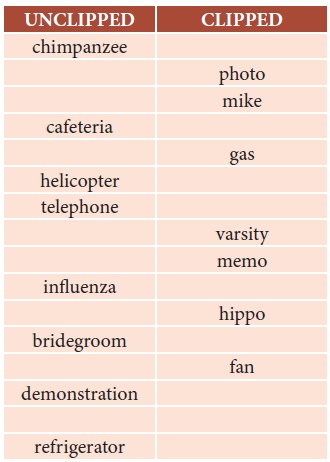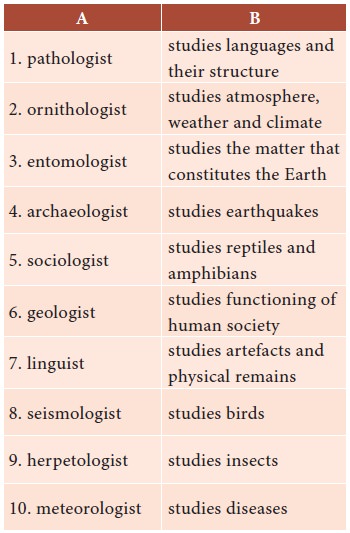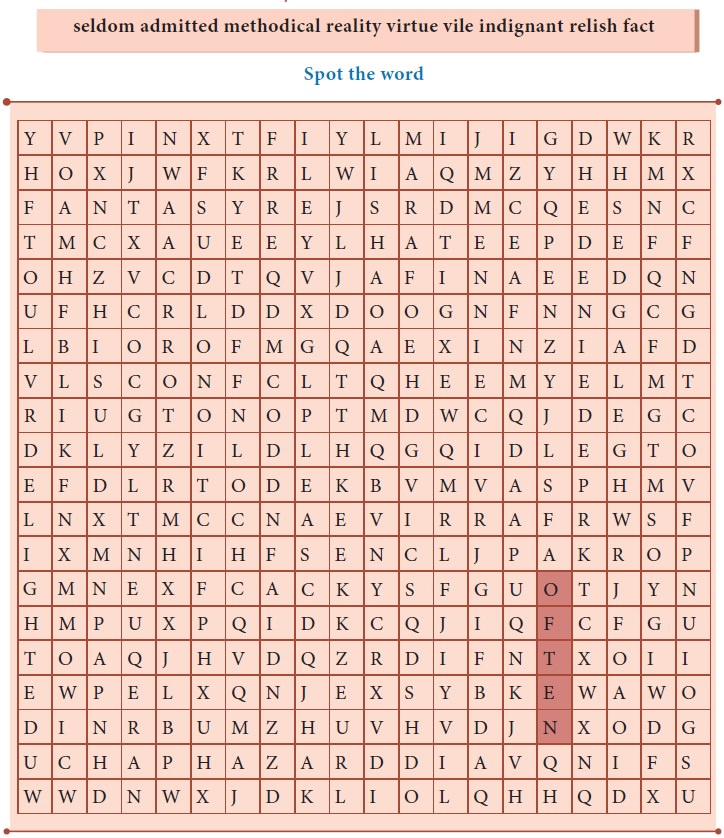Homonyms and Heteronyms, Clipped Words - Forgetting: Vocabulary | 11th English : UNIT 3 : Prose: Forgetting
Chapter: 11th English : UNIT 3 : Prose: Forgetting
Forgetting: Vocabulary
Vocabulary
A. Homonyms and Heteronyms
Homonyms are two or more words that have same pronunciation but different meanings. They are of two types:
i. Homographs
Homographs are words with same spelling and same sound but different in meanings.
e.g. park – a piece of public land for recreation / park – to leave a vehicle in a particular place
bat – a sport equipment for hitting the ball / bat – a mammal
ii. Homophones
Homophones are two or more words with the same sound but with different spellings and meanings.
e.g. dear – a loved one / deer – a wild animal
Heteronyms also known as heterophones are two or more words with same spelling but different sounds and meanings.
e.g. lead – a metal / lead – guide
minute – a period of time / minute – very small
Complete the sentences by choosing a suitable word from those given in the brackets.
i. Nobody can say whether there will be an improvement in the weather. (whether / weather)
ii. Your ring is loose. Do not lose it. (loose / lose)
iii. We found a packet of biscuits in the old man’s shirt pocket. (pocket / packet)
iv. When the pole vaulter cleared 28 feet, it was declared a record feat. (feet / feat)
v. Explain the quote ‘Cut your coat according to your cloth.’ (coat / quote)
vi. The stranger paused for a few minutes before he passed my house. (paused / passed)
vii. The wiry dancer turned weary after the final performance. (weary / wiry)
viii. The chain that I presented to my sister was not made of gold; it was just gilt. I am suffering from a sense of guilt. (guilt / gilt)
Form meaningful sentences using the given words to bring out at least two different meanings.
1. train 4. light
2. tear 5. file
3. wind 6. bear
1. train
a) They travel by train. (Noun)
b) They train the dogs,
(verb)
2. tear
a) When I scold my sister, tears rolled down her cheeks, (noun)
b) The
children tear the papers, (verb)
3. wind
a) The North wind is dangerous, (noun)
b) The professor will wind up the session with a joke, (verb)
4. light
a) The chief guest will light the lamp, (verb)
b) I bought a light weight bi-cycle yesterday. (Adjective)
5. file
a) They will file a case against the lorry driver, (verb)
b) I
bought a file last night. (Noun)
6. bear
a) The bear in the zoo is very arrogant. (Noun)
b) I can’t bear
with your behaviour, (verb)
B. Clipped Words
We came across the word ‘perambulator’ in the last paragraph of the story. The word ‘perambulator’ can also be expressed as ‘pram’ in short. The word ‘perambulator’ is an unclipped word and the word ‘pram’ is a clipped word.
What are clipped words?
Clipped words are words that are formed by dropping one or more syllables from longer words without changing the meaning. Clipping is forming new words by shortening long words. We usually use them while speaking or in informal speech.
e.g. aeroplane – plane examination – exam demarcate – mark
Now, write the clipped and unclipped form of the given words and complete the table.

Answers:
(a)chimp
(b)photograph
(c)microphone
(d)cafe
(h)university
(i)memorandum
(j)flu
(m)fanatic
(n)demo
(o)perambulator
c. ‘Certain psychologists tell us that we forget things because we wish to forget them.’ Who is a psychologist?
One who studies the human mind and behaviour is a psychologist.
Now, refer to a dictionary and match the professions with their relevant job descriptions.

1) studies diseases
2) studies birds
3) studies insects
4) studies artefacts and physical remains
5) studies functioning of human society
6) studies the matter that constitutes the Earth
7) studies languages and their structure
8) studies earthquakes
9) studies reptiles and amphibians
10) studies atmosphere, weather and ciimate
Fill in the blanks choosing the words from the box. Refer to a dictionary if required. One has been done for you.
thespian sadist polyglot
ambidextrous philanthropist
misanthrope bibliophile
nonagenarian teetotaller
globetrotter optimist
e.g. My brother buys a load of books at the book fair every year. He is a great lover of books and has a huge collection at home. He is a bibliophile.
i. Peter always refuses alcohol, when it is offered to him at parties and takes a soft drink instead. He says he always has and always will abstain from alcohol and it is a matter of principle for him. We can call Peter a Teetotaller.
ii. Aruna always looks at the bright side of things. Even in the face of misfortune, she firmly believes that everything will work out for the best in the end. What can we call Aruna? Optimist.
iii. The rich industrialist donated a huge sum of money to set up a public library in his native village. He is a Philanthropist and a social reformer.
iv. The Chair person of our company keeps travelling all over the world to attend conferences and we call her a Globetrotter.
v. Antony has the amazing ability to use both his hands, equally well. He can write, draw and perform various other tasks with equal speed and efficiency with his left as well as his right hand. Antony is Ambidextrous.
vi. Due to some disturbing incidents in her childhood, Neetu grew into a reclusive adult. She tends to keep aloof and avoids all kinds of social activities. Neetu is a Misanthrope.
vii. Tharini serves as interpreter at meetings between statesmen from different countries. She is also a much sought-after tour guide, as she is well-versed and fluent in multiple languages. Tharini is a Polyglot.
viii. My grandparents are in their nineties. I am glad that this Nonagenarian couple are active, cheerful and in good health.
ix. Richard Burton was a gifted theatre artist. He donned several roles with ease and is especially famous for the Shakespearean parts he played on stage. Mr. Burton is a born Thespian.
x. The Chairman of this concern seems to derive pleasure from inflicting pain on others. He humiliates and hurts his subordinates for no reason. He is a real Sadist.
d) Find the antonyms of the following words in the puzzle and shade them with a pencil. The first one has been done for you.
1. seldom x often
2. admitted x denied
3. methodical x obscure
4. reality x fantasy
5. virtue x vice
6. vile x good
7. indignant x delighted
8. relish x hate
9. fact x fiction
Spot the word

Related Topics